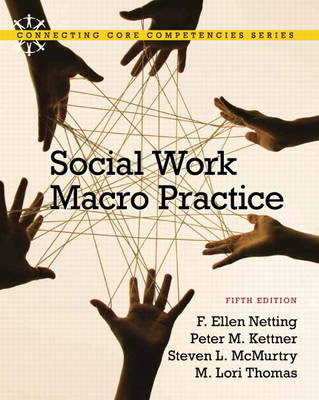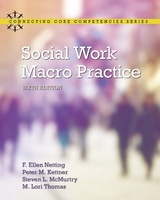
Social Work Macro Practice
Pearson (Verlag)
978-0-205-83878-3 (ISBN)
- Titel erscheint in neuer Auflage
- Artikel merken
Explores working with organizations and communities with a unique macro practice model focusing on making changes within diverse communities and organizations.
This book is part of the Connecting Core Competencies Series. This series helps students understand and master CSWE’s core competencies with a variety of pedagogy highlighted competency content and critical thinking questions for the competencies throughout.
The book focuses on work with organizations and communities, including planned change approaches and implementation.
Teaching & Learning Experience
Improve Critical Thinking – The entire text takes students from conceptual understanding to practicalities of implementation.
Engage Students – A blend of historical ideologies with contemporary trends allows students to explore the development of social work practices.
Explore Current Issues – The new edition includes up-to-date information on values and ethical dilemmas and community and organization analysis.
Apply CSWE Core Competencies – Integrates the 2008 CSWE EPAS throughout – highlights competencies and practice behaviors and includes expensive pedagogy.
Support Instructors – Instructor’s Manual and Test Bank, Computerized Test Bank (MyTest), Blackboard Test Item File, and PowerPoint presentations are included in the outstanding supplements package.
F. Ellen Netting is Professor and Samuel S. Wurtzel Endowed Faculty Chair in Social Work at VCU School of Social Work. She completed her PhD in Social Service Administration at The University of Chicago in 1982. For over 18 years, she has taught across social work programs at VCU, having previously taught 10 years at Arizona State University. Her practice experience includes directing a county office on aging and senior citizens center, directing a community-based Foster Grandparent Program, and serving as the evaluator and trainer in a 16-country area agency on aging. She helped develop the first long-term care ombudsman volunteer program in East Tennessee. She is the co-author or co-editor of 16 books and has published over 175 book chapters and refereed journal articles on subjects related to aging, volunteerism, faith-based human service organizations, and social work macro practice. Peter M. Kettner is Professor Emeritus at Arizona State University School of Social Work. He is author or co-author of six books, four of which have been translated into multiple languages. He has also authored over 50 articles, monographs, and book chapters on the topics of purchase-of-service contracting, privatization, macro practice in social work, human services planning, and social work administration. Over his 30 year career in academia he served as consultant to five different state human service agencies and dozens of local nonprofit agencies on their purchase of service contracting practices and in the design and implementation of effectiveness-based planning systems. In retirement he has continued his writing and consultation with local government and nonprofit agencies. Steven L. McMurtry is a professor in the Helen Bader School of Social Welfare at the University of Wisconsin-Milwaukee. He is a graduate of Texas Tech University and the University of Texas-Arlington, and he received his Ph.D. in Social Welfare from the University of Wisconsin-Madison. Prior to assuming his current position he was a member of the faculty at Arizona State University and a Fulbright Research Fellow at the University of Calgary. Early in his career he served as a child welfare worker and evaluator. In addition to macro practice, his research and publications have examined issues such as prediction of successful exits from foster care and retention of staff in child welfare organizations. He currently chairs the Ph.D. program in his department and co-directs a federally funded training program for current and prospective child welfare workers. M. Lori Thomas is an Assistant Professor of Social Work at the University of North Carolina at Charlotte. She completed her PhD in Social Work at Virginia Commonwealth University in Richmond, Virginia in 2008. Her scholarship interests include organization, community, and policy practice in homelessness, particularly for older adults and those experiencing serious mental illness or co-occurring disorders. Lori is also interested in the intersection of religion and social welfare, completing national collaborative research on best practices in faith-based human services and dissertation research on faith-based advocacy organizations. Lori has over 10 years of work experience in affordable housing and homeless services. Most recently, she coordinated and directed the development of a permanent housing and comprehensive mental health program for homeless individuals in the Greater Richmond, Virginia area.
IN THIS SECTION:
1.) BRIEF TABLE OF CONTENTS
2.) FULL TABLE OF CONTENTS
BRIEF TABLE OF CONTENTS:
Chapter 1: An Introduction to Macro Practice in Social Work
Chapter 2: The Historical Roots of Macro Practice
Chapter 3: Understanding Community and Organizational Problems
Chapter 4: Understanding Populations
Chapter 5: Understanding Communities
Chapter 6: Assessing Communities
Chapter 7: Understanding Organizations
Chapter 8: Assessing Human Service Organizations
Chapter 9: Building Support for the Proposed Change
Chapter 10: Selecting Appropriate Strategies and Tactics
Chapter 11: Planning, Implementing, Monitoring, and Evaluating the Intervention
FULL TABLE OF CONTENTS:
Chapter 1: An Introduction to Macro Practice in Social Work
Macro Practice in Context
What Is Macro Practice?
The Foundation of Macro Practice
Three Case Examples
Surviving the Dilemmas
Professional Identity
Summary
Chapter 2: The Historical Roots of Macro Practice
Trends Underlying the Emergence of Social Work Roles
Community Organization and Social Reform
The Organizational Context of Social Work
Contemporary Trends
The Importance of Change
Summary
Chapter 3: Understanding Community and Organizational Problems
What Is Social Work Practice?
Guidelines for Planning Change
Understanding Problems and Opportunities
Summary
Appendix: Framework for Understanding Community and Organizational Problems
Chapter 4: Understanding Populations
Selecting and Studying a Population
Understanding Problems and Populations
Summary
Appendix: Framework for Understanding the Target Population
Chapter 5: Understanding Communities
Introduction
Community Functions
Systems Theory
Human or Population Ecology Theory
Human Behavior Theories
Theories about Power, Politics, and Change
Contemporary Perspectives
Community Practice Models
Summary
Chapter 6: Assessing Communities
Introduction
Two Community Vignettes
Framework for Community Assessment
Summary
Appendix: Framework for Assessing Community
Chapter 7: Understanding Organizations
Introduction
Bureaucracy and Organizational Structure Management Theories
Organizational Goals and the Natural-System Perspective
Decision Making
Organizations as Open Systems
Contemporary Perspectives
Summary
Chapter 8: Assessing Human Service Organizations
Introduction
Two Vignettes of Human Service Organizations
Framework for Organizational Assessment
Summary
Appendix: Framework for Assessing a Human Service Organization
Chapter 9: Building Support for the Proposed Change
Designing the Intervention
Building Support
Selecting an Approach to Change
Summary
Appendix: Framework for Developing an Intervention
Chapter 10: Selecting Appropriate Strategies and Tactics
Assessing the Political and Economic Context
Selecting Strategies and Tactics
Summary
Appendix: Framework for Selecting Appropriate Tactics
Chapter 11: Planning, Implementing, Monitoring, and Evaluating the Intervention
Planning the Details of the Intervention
Intervention Planning
Developing Objectives for the Intervention
Implementing and Monitoring the Plan
Summary
Appendix – Part 1: Framework for Planning, Implementing, Monitoring, and Evaluating the Intervention
Appendix –Part 2: Case Example: Jackson County Foster Care
| Erscheint lt. Verlag | 11.8.2011 |
|---|---|
| Sprache | englisch |
| Maße | 206 x 248 mm |
| Gewicht | 680 g |
| Themenwelt | Schulbuch / Wörterbuch |
| Sozialwissenschaften ► Pädagogik ► Sozialpädagogik | |
| Sozialwissenschaften ► Soziologie | |
| ISBN-10 | 0-205-83878-2 / 0205838782 |
| ISBN-13 | 978-0-205-83878-3 / 9780205838783 |
| Zustand | Neuware |
| Haben Sie eine Frage zum Produkt? |
aus dem Bereich



